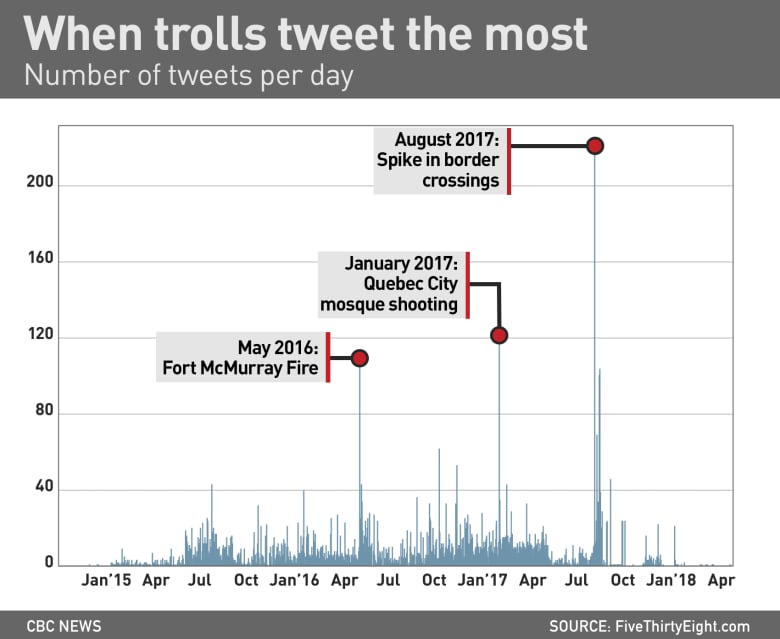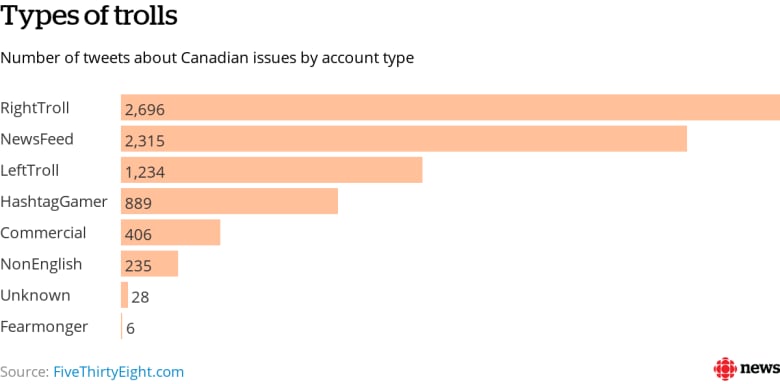Data sheds light on how Russian Twitter trolls targeted Canadians
Tweets tried to sow discord on asylum seekers, Syria and pipelines

In the fall of 2017, when Americans were debating if athletes should kneel during the U.S. national anthem as a form of protest, Russian trolls on Twitter tried to inject the controversy into Canada.
"The Canadian Football League is Protesting THEIR OWN National Anthem!" tweeted the account @chirrismogui.
"Canadian NHL Player CONSIDERING 'Taking a Knee' During U.S. Anthem," wrote another account, @brristasi.
These tweets and accounts — along with millions of others — have since been deleted after being outed as trolls with the Internet Research Agency, a company in St. Petersburg with ties to Russian government intelligence.
They are part of a cache of some 3 million archived tweets recently pulled together by two American researchers. And the newly released data sheds further light on how the now-notorious troll farm sought to sow discord not only among Americans, but Canadians as well.
According to a CBC News analysis, out of those 3 million tweets, close to 8,000 mentioned Canadian issues, like asylum seekers, the Quebec City mosque shooting and the Keystone XL pipeline.
"Canada FORCED to take DRASTIC Action to Stop Illegals From Flooding In," wrote one tweet the the height of the border crossings last summer, shown in the highest spike (at right) in the chart below.

Others tried to capitalize on major news events, like the 2017 van attack in Edmonton, when a police officer was stabbed and four pedestrians were struck along the city's busy Jasper Avenue.
The trolls even used popular hashtags used to discuss federal (#cdnpoli) and provincial politics (#onpoli, #bcpoli, #ableg).
The data was published by the FiveThirtyEight website and is based on research by Darren Linvill and Patrick Warren, two professors at South Carolina's Clemson University who pieced together the tweets, pulling more than 2,800 Twitter accounts known to be associated with the IRA.
It's believed to be the most fulsome record to date of the Russian Twitter trolling.
Earlier this year, as part of the Mueller probe into Russia's interference into the 2016 U.S. presidential election, 13 Russian nationals and three Russian entities were indicted, including the IRA.
Divide and conquer tactics
Part of the IRA's campaign involved creating fake social media accounts and posting inflammatory and polarizing content on both sides of a debate. Millions of the tweets were deleted and the accounts removed, but their archived texts reveal how they tried to sow discord among social media users.
The fact that these trolls also targeted Canadians comes as no surprise to Stephanie MacLellan, a cybersecurity analyst at the Waterloo, Ont.-based think-tank the Centre for International Governance and Innovation
"Russian trolls went after other liberal democratic countries — and Canada has been a vocal defender the liberal democratic order, like the NATO alliance," said MacLellan.
"This goes with the general trend [of the Russian government] trying to undermine countries that oppose its ambitions."
It's not clear how many people these tweets reached; the number of times a tweet was retweeted and who amplified the message is not in the data. However, the number of followers these troll accounts had can suggest their reach.
Some of the more active accounts that tweeted about Canadian issues had between 2,300 and 44,000 followers. Most were categorized by the researchers as "Right Trolls," who tweet inflammatory views with a right-wing slant.

In all, the researchers identified five distinct categories. The others include:
- Left Trolls: Accounts who tweeted left-leaning, intentionally divisive tweets largely focused on cultural identity.
- News Feed: Accounts that presented themselves as legitimate aggregators by simply tweeting news headlines.
- Hashtag Gamer: Accounts that took part in hashtag games. (For example, using the hashtag #MakeTVShowsCanadian, one account tweeted "How I Met Your Mountie.")
- Fearmonger: Accounts that spread news about a fake crisis, such as salmonella-tainted turkeys.
The goal of these posts is often not to influence voting, but to create confusion and division within a population, said Fenwick McKelvey, an assistant professor at Montreal's Concordia University who researches social media platforms.
"They find hot-button issues and play both sides," he said. "It's a way of exploiting existing conflicts; an effective campaign would make us hate each other more."
'A lot of experimentation'
Of the 8,000 tweets analyzed, just over 100 mention Syria — an obvious point of disagreement for Canadians, McKelvey notes.
"Canadians are split on it [humanitarian support for Syrian refugees]," he said. "If there's less support for it at home, it might play into Russian interests."
McKelvey said he doubts the effectiveness this kind of information warfare, as Twitter is not an important source of news for many Canadians. But because it's one of the few platforms that makes its data public, it can be useful as a window into patterns of disinformation campaigns.
"There's a lot of experimentation going on. The main model of the web is to put something up and see if it sticks," he said.
U.S. intelligence agencies concluded that Russia interfered in the 2016 election that brought U.S. President Donald Trump to the White House, and former FBI director Robert Mueller is leading an ongoing investigation into the meddling.
The Communications Security Establishment (CSE), a branch of National Defence tasked with cybersecurity, said in an email it has assessed the threats to Canada and "did not observe nation-states using cyber capabilities with the intent of influencing the democratic process in Canada."
A CSE report, however, says it will be watching for such activity ahead of the 2019 federal election.
The Canadian Security Intelligence Service (CSIS) also acknowledges it is aware of the issue and hosted a workshop on disinformation tactics by foreign states last year. A paragraph in a resulting report suggests how hard it is to fight it:
"The negative impact on democracy of false news could increase if Russia and other actors become role models for others, increasing the distribution of malignant material through all the pathways of the electronic age," it reads.
"Disinformation poisons public debate and is a threat to democracy.… There are many ways for governments and organisations to counter the threat, but there is no guarantee that even effective counter-campaigns can defeat the high volume flow of malicious communications."
Methodology
To isolate tweets targeting Canadians, the CBC searched the tweets for 60 keywords including the names of public figures (Justin Trudeau, Rob Ford, Ezra Levant), places (Toronto, Alberta) and organizations (Kinder Morgan, CBC, NDP), as well as popular hashtags like #cdnpoli, #onpoli, and #polqc.
These do not necessarily include all tweets about Canada, and some U.S.-specific tweets may have been included in the search.
The code used to analyze the tweets can be found on GitHub.